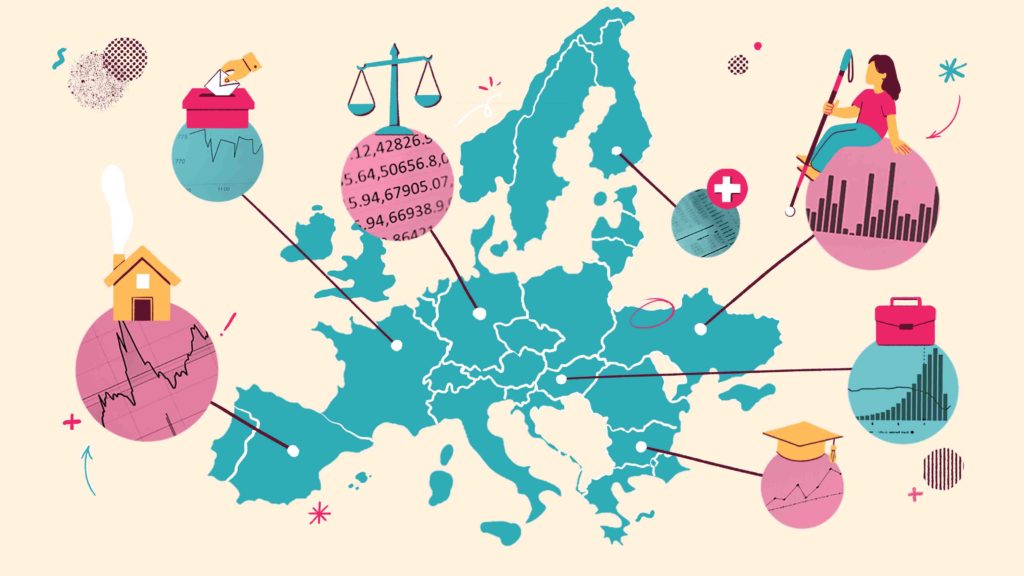Inclusion Europe year-end summary.
Dear friends, colleagues.
I want to thank each and every one of you for all your work supporting full rights and inclusion of people with intellectual disabilities.
2023 saw a lot of things we can proudly share in a year-end summary.
And we wouldn’t be here without the dedication, hard work, and generous spirit of so many of you.
Thank you!
2 speeches by self-advocates at big European events
“I have faced lots of barriers as a person with an intellectual disability and my rights are often ignored. I say I am really lucky in my life but it should not be about luck, it is my right to be treated like anyone one else in my country.” Tamara Byrne said during the European Disability Parliament in May.
“The reason I tell people my story is so others can learn about their rights and how you can change your own life if you speak up for yourself. People are often afraid to speak up because of institutions or families or they don’t feel part of their community.” Paul Alford said during the European Day of Persons with Disabilities in December.
150 participants from 11 countries came together for Hear our Voices! self-advocacy conference in Tallinn, Estonia
“I believe that self-advocates can build a link between decision-makers and people with intellectual disabilities.” László Bercse said during the conference.
“We believe everyone has the right to enjoy life.
We believe everyone must have their rights respected.
This is what we want to say.
Listen to us.”
That’s how the self-advocates’ statement from the conference opens. Read it.
9 language versions of Europe for us easy-to-read magazine
Lates issue of the magazine was done in 9 languages. It is about the right to vote, as there will be European elections in 2024.
European Parliament has information about the elections in easy to read now!
71 media appearances, in 10 languages
Inclusion Europe work was mentioned in the media more than 70 times second year in a row.
Quite a few of these mentions were in France, following the success of a complaint about the treatment of people with disabilities in the country.
40 contributions to conferences, seminars, and trainings
We were invited to speak to more than 3,000 people during the year, which is a very conservative estimate.
30,000 follow Inclusion Europe social media
You can get news from Inclusion Europe on Facebook, Instagram, LinkedIn, Threads, WhatsApp, or X.
You can also watch our videos on YouTube.
And you can listen to Inclusion Europe Radio.
Obviously, we also did a lot of work that is less easy to describe here:
- Contributed to many discussions and documents in the European Union, and Council of Europe.
- Supported self-advocates to speak and contribute to many other events and conversations.
And of course, we continue to support the brave work of our friends and colleagues in Ukraine.
- There are trainings for self-advocates and for family members, for example about decision-making.
- There is advocacy work on legal capacity, easy to read, or deinstitutionalisations.
- And there is support for the Ukrainian self-advocates and family members to participate in our events and other work.
Most of all, we worked on our new big thing: Inclusion indicators.
7 indicators about rights and inclusion of people with intellectual disabilities in 29 European countries
- 750,000 people with intellectual disabilities segregated in large “care” institutions.
- Families, isolated, left as the sole “care providers”.
I was very happy to see your reactions when we published the report. It was very positive, thank you.
We have big plans for this report.
We hope many people will use Inclusion indicators to ask their government to do better when it comes to rights and inclusion of people with intellectual disabilities and families.
Which brings us to what’s coming next.
Inclusion Europe has been here for 35 years now, promoting full rights and inclusion of 20 million people with intellectual disabilities and families in Europe.
And we made a lot of progress together.
But there are still many people with intellectual disabilities who suffer segregation, and many families facing isolation.
Many people who cannot even tell their story at conferences or in a video, because resources for self-advocacy are so limited, and possibilities to connect so restricted.
And that’s what we are tackling next:
1. To make sure every possible self-advocate and family member can tell their story face to face with those who need to hear it.
2. To bring the best advocacy and research into EU and other relevant decision-making. To influence where it matters with expertise that makes a difference.
3. To collaborate across Europe on things that change peoples’ lives: From self-advocacy, through deinstitutionalisation, to any other thing that brings people together to end segregation.
Our purpose is to end segregation of people with intellectual disabilities, and isolation of their families.
It is a big ask.
So we need to be big, and to act big to achieve it.
Together, achieve it we will.
Have a good 2024!
Help us end segregation of people with intellectual disabilities, and isolation of their families.